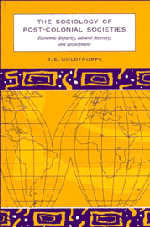Book contents
- Frontmatter
- Contents
- Preface and acknowledgements
- 1 Introduction and argument
- 2 Technology, society, and population
- 3 The colonial episode and the race question
- 4 Economic conditions
- 5 Environmental concerns
- 6 The social sciences and the ‘Third World’
- 7 The rise of towns
- 8 Family life in a changing world: two studies
- 9 Cultural diversity, language, education, and communications
- 10 Religion and development
- 11 Individual modernization: some psychological studies
- 12 Politics in post-colonial states
- 13 Aid and development
- Notes
- Index
11 - Individual modernization: some psychological studies
Published online by Cambridge University Press: 03 May 2011
- Frontmatter
- Contents
- Preface and acknowledgements
- 1 Introduction and argument
- 2 Technology, society, and population
- 3 The colonial episode and the race question
- 4 Economic conditions
- 5 Environmental concerns
- 6 The social sciences and the ‘Third World’
- 7 The rise of towns
- 8 Family life in a changing world: two studies
- 9 Cultural diversity, language, education, and communications
- 10 Religion and development
- 11 Individual modernization: some psychological studies
- 12 Politics in post-colonial states
- 13 Aid and development
- Notes
- Index
Summary
From the late 1950s onwards, growing interest in development studies in economics and other social sciences was matched by studies of the social psychology of individual change in relation to development, having at least their initial orientation in the modernization school of thought.
Leonard W. Doob on ‘becoming more civilized’
A pioneer study in this field was that of the Yale psychologist L. W. Doob, whose previous work had included research on public opinion and propaganda. His ‘two principal questions’ were why some people in less civilized societies became more civilized in some respects, and what happened to them as they did so.
Among the earlier studies of societies undergoing change, many of them the work of anthropologists, on which he drew in framing his hypotheses, were those by Lerner in the Middle East; and Doob used the terms ‘less civilized’ and ‘(more) civilized’ more or less interchangeably with Lerner's ‘traditional’, ‘transitional’, and ‘modern’. Doob's own field studies were carried out in the 1950s in Jamaica and three African societies, Luo, Ganda, and Zulu, by means of interviews comparing the responses of the old with the young and the schooled with the illiterate.
Some of Doob's twenty-seven hypotheses were quite specific and could be confirmed or disproved. Thus ‘people changing centrally from old to new ways’ were found to have longer time-horizons. People changing in other respects were likely to retain traditional family attitudes. And people changing their ways were probably apt to join new groups and put more value on traits like initiative, independence, and self-confidence.
- Type
- Chapter
- Information
- The Sociology of Post-Colonial SocietiesEconomic Disparity, Cultural Diversity and Development, pp. 200 - 209Publisher: Cambridge University PressPrint publication year: 1996



